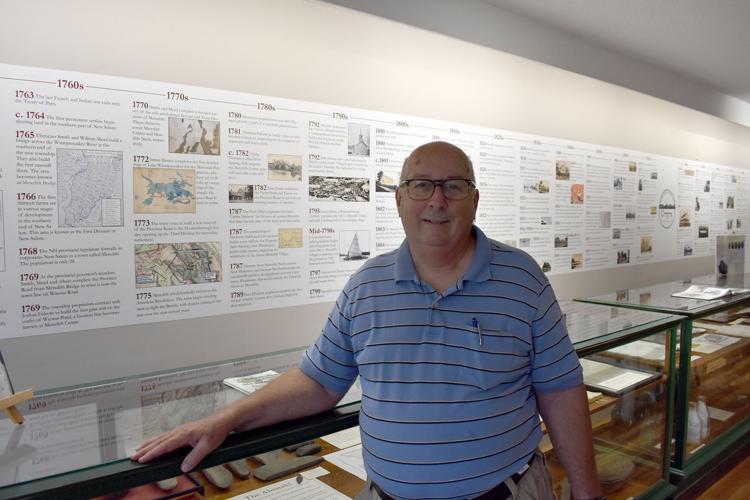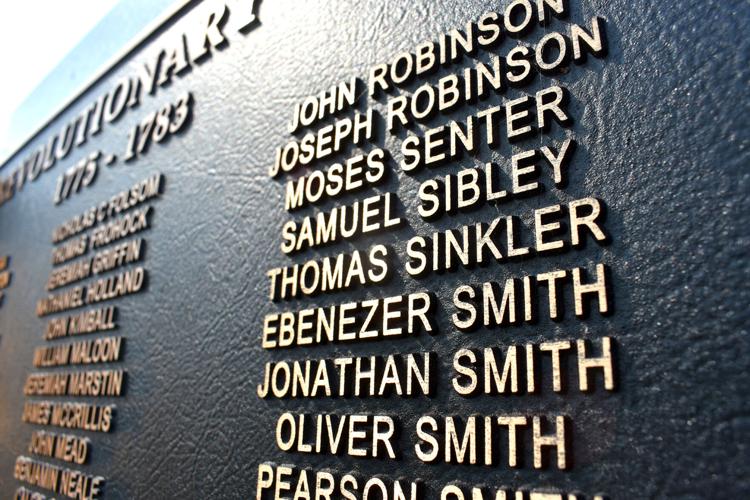MEREDITH — The directive from his constituency was clear: reject the newly-written federal Constitution at New Hampshire’s Constitutional Convention in 1788. Instead, he acted in the opposite direction, steering the process to an outcome in which the state ratified the then-controversial document.
In doing so, argues a Meredith historian in a recent biography of Ebenezer Smith, Meredith’s “Founding Father” as termed by author, journalist and historian Rudy VanVeghten, might well have saved a fledgling nation from shattering — in which case there would have been nothing to celebrate this Independence Day.
VanVeghten’s biography “Ebenezer Smith, Meredith’s Prime Mover” was published last year by the Meredith Historical Society. The author is scheduled to give a talk in Laconia — a community Smith was also critical in founding — at the Leavitt Park Clubhouse on Tuesday, Aug. 19.
A young colonist
By the time of his birth in 1734, Smith’s family had already been part of Colonial America for two generations. He was born into a well-heeled family with good political connections, VanVeghten’s research concludes. Smith was born in Ipswich, Massachusetts, and his family moved to Exeter a decade later. Smith was the beneficiary of a good education in Exeter, which, along with his family standing, gave him advantages as an adult.
Smith was one who, his life story tells, knew advantage when he saw it. As such, part of the estate left after his father’s death included the grant for a tract of land bordering Lake Winnipesaukee. That property was of trivial value in face of the rest of the estate, and seems to have been ignored by Daniel Smth Jr., Ebenezer’s elder brother, who would have had the first opportunity to pursue its development. It was Ebenezer, though, who recognized the potential.
Smith, whose training earned him the role of tax assessor for the “New Salem” grant, as the town was known at the time, was quickly promoted to tax collector.
VanVeghten describes a man of various skills. Some, such as his first roles with the town, leaned on abilities he would have gained through his education. Others, such as sawmill operator, innkeeper, roadbuilder and farmer, he seemingly gained through experience.
Smith became the most wealthy resident of Meredith, and its most powerful. First, though, he was among the few who made the town’s settlement by colonists possible, such as by building the road into the grant, including building the first bridge across the Winnipesaukee River.
That bridge — roughly where Laconia’s Main Street crosses the river in today’s downtown — was in Gilmanton at the time, and the collection of commerce which formed around that bridge led to a community first known as Meredith Bridge, which evolved into the City of Laconia.
Federalist
In addition to his various vocations, Smith was a combatant. He took up arms as a militia leader during the Revolutionary War, and his service to the country was rewarded with political victories. His activities in the Legislature showed his capacity for acting according to his own conscience, rather than dutifully representing his constituency.
One example cited by VanVeghten in an interview is an effort in Meredith to revert to its older nomenclature, “New Salem,” as its current town name was apparently selected by the Colonial governor. There’s no evidence, Vanveghten said, that Smith ever filed such a bill.
A more consequential piece of maneuvering came in 1788, when Smith was elected to represent Meredith and New Hampton during the state’s Constitutional Convention, a special assembly asking the state to ratify the document which created the federal government we have today. VanVeghten credits his understanding of this episode to the work of Jere Daniell, a now-deceased Dartmouth history professor who gave a talk to the Meredith Historical Society in 1990.
As Daniell told, the episode begins in 1787, when the Constitution was drafted in Philadelphia. Prior, the country was governed under the Articles of Confederation, an organization which granted states considerable amounts of autonomy, but left the country without a means for common defense against a hostile nation, and failed to provide means for interstate or international commerce.
The need for a federal government, though, was not universally recognized, and some who saw the necessity still found fault with the document’s details. According to Daniell, some critics disliked how the president would be able to hold office for four years, and senators for six, while others thought political office should be reserved only for Protestants — which the New Hampshire Constitution, at the time, required. Lastly, Daniell noted there was a connection between social status and federal favorability, in that the higher a person’s title, the more likely they were to support the Constitution, and vice versa.
Regardless of their reason why, a sound majority of New Hampshire citizens disliked the Constitution, Daniell said during his talk. Smith’s constituents were solidly anti-Constitution, and sent him to the Convention in February of 1788, expecting him to reject, not ratify. But Smith had another set of obligations as well, as part of the committee that set the rules for the Convention. One of those rules, VanVeghten said, was motions to recess or delay the convention would take immediate precedence over any other matter currently on the table.
That gave Federalists a powerful playing card, and they decided to play it after a week of debate. At that point, it was apparent to those counting likely votes the process would fail if a final vote were to be called. The Convention was adjourned with the ratification unanswered, to reconvene in June of that year, this time in Concord.
Some things changed in those intervening months. One was that two states, Maryland and South Carolina, voted to ratify. Another was that Federalists had been busy politicking, convincing delegates on the fence to vote in favor. In the end, their maneuvering worked. Of the 108 delegates at the state convention, 57 voted in favor of ratification, 47 voted against and four, including Smith, abstained.
VanVeghten agreed that although he held back his vote, Smith used his capacities as an organizer of the Convention to effect the outcome, while doing so in a way that wouldn't overtly betray his constituents.
In 1990, as quoted by VanVeghten, Daniell stated an even stronger case. He noted New Hampshire’s vote was critical, as it was among nine states which voted to ratify. According to the rules of the Philadelphia Convention, nine states were required to adopt it in order for it to take effect.
“My reading of what is likely to have happened if New Hampshire had voted against the Constitution, which they almost did, the Constitution would not have been ratified. What would happen after that is anyone’s guess. I think the most likely scenario is we would be part of a nation which includes Newfoundland, Nova Scotia, New Brunswick and the New England states.”
Daniell went on to say, “I’ll go out on a limb. I can’t prove this, but I’d say that if Ebenezer had not been the delegate from Meredith and New Hampton in the ratifying convention in New Hampshire, there is a good chance we would have no federal Constitution today.”



















(0) comments
Welcome to the discussion.
Log In
Keep it Clean. Please avoid obscene, vulgar, lewd, racist or sexually-oriented language.
PLEASE TURN OFF YOUR CAPS LOCK.
Don't Threaten. Threats of harming another person will not be tolerated.
Be Truthful. Don't knowingly lie about anyone or anything.
Be Nice. No racism, sexism or any sort of -ism that is degrading to another person.
Be Proactive. Use the 'Report' link on each comment to let us know of abusive posts.
Share with Us. We'd love to hear eyewitness accounts, the history behind an article.